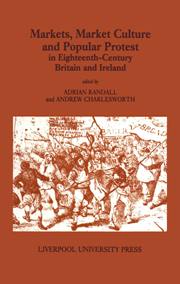Book contents
- Frontmatter
- Contents
- Contributors
- Preface
- 1 Markets, Market Culture and Popular Protest in Eighteenth-Century Britain and Ireland
- 2 Popular Protest and the Persistence of Customary Corn Measures: Resistance to the Winchester Bushel in the English West
- 3 The Jack-a-Lent Riots and Opposition to Turnpikes in the Bristol Region in 1749
- 4 The Cider Tax, Popular Symbolism and Opposition in Mid-Hanoverian England
- 5 Scarcity and the Civic Tradition: Market Management in Bristol, 1709–1815
- 6 The Moral Economy of the English Middling Sort in the Eighteenth Century: the Case of Norwich in 1766 and 1767
- 7 Oxford Food Riots: a Community and its Markets
- 8 The Irish Famine of 1799–1801: Market Culture, Moral Economies and Social Protest
- Index
5 - Scarcity and the Civic Tradition: Market Management in Bristol, 1709–1815
- Frontmatter
- Contents
- Contributors
- Preface
- 1 Markets, Market Culture and Popular Protest in Eighteenth-Century Britain and Ireland
- 2 Popular Protest and the Persistence of Customary Corn Measures: Resistance to the Winchester Bushel in the English West
- 3 The Jack-a-Lent Riots and Opposition to Turnpikes in the Bristol Region in 1749
- 4 The Cider Tax, Popular Symbolism and Opposition in Mid-Hanoverian England
- 5 Scarcity and the Civic Tradition: Market Management in Bristol, 1709–1815
- 6 The Moral Economy of the English Middling Sort in the Eighteenth Century: the Case of Norwich in 1766 and 1767
- 7 Oxford Food Riots: a Community and its Markets
- 8 The Irish Famine of 1799–1801: Market Culture, Moral Economies and Social Protest
- Index
Summary
Past studies of scarcity in England have focused primarily upon the reactive behaviour of the labouring poor, and specifically the incidence and cultural precepts of riot. While some studies have laboured over the identification of ‘perennially’ riotous or non-riotous communities, measures taken by urban elites to manage and alleviate scarcity have been largely neglected. One scholar, John Bohstedt, has discussed the non-viability of ‘community politics’ in the modern ‘city of strangers’, setting up telling comparisons between the reciprocal paternalism of rural Devon and the nascent class antagonism that underpinned social relations in booming new industrial towns like Manchester. But studies of towns in which conditions permitted the co-existence of modernism and tradition are something of a rarity. Bristol, in common with many English towns and cities, experienced price rioting in lean years, but it cannot simply be described as a riotous, violent or socially alienated community. Indeed, in many of the most serious periods of scarcity, disorder was averted in the city despite rioting in surrounding districts. This essay examines the development of a ‘civic tradition’ of market management in Bristol, under which loosely allied corporate, commercial and middling-class interests acted to promote social harmony, preserving the integrity of what Bohstedt would call ‘horizontal relationships’ by broadening them in the teeth of recession. It was, it is argued, the unprecedented social violence unleashed by food price disturbances in 1753 which prompted recognition of the need for effective management—both of the market itself, by a variety of means, and of the machinery of law enforcement.
- Type
- Chapter
- Information
- Markets, Market Culture and Popular Protest in Eighteenth-Century Britain and Ireland , pp. 91 - 114Publisher: Liverpool University PressPrint publication year: 1996
- 1
- Cited by

